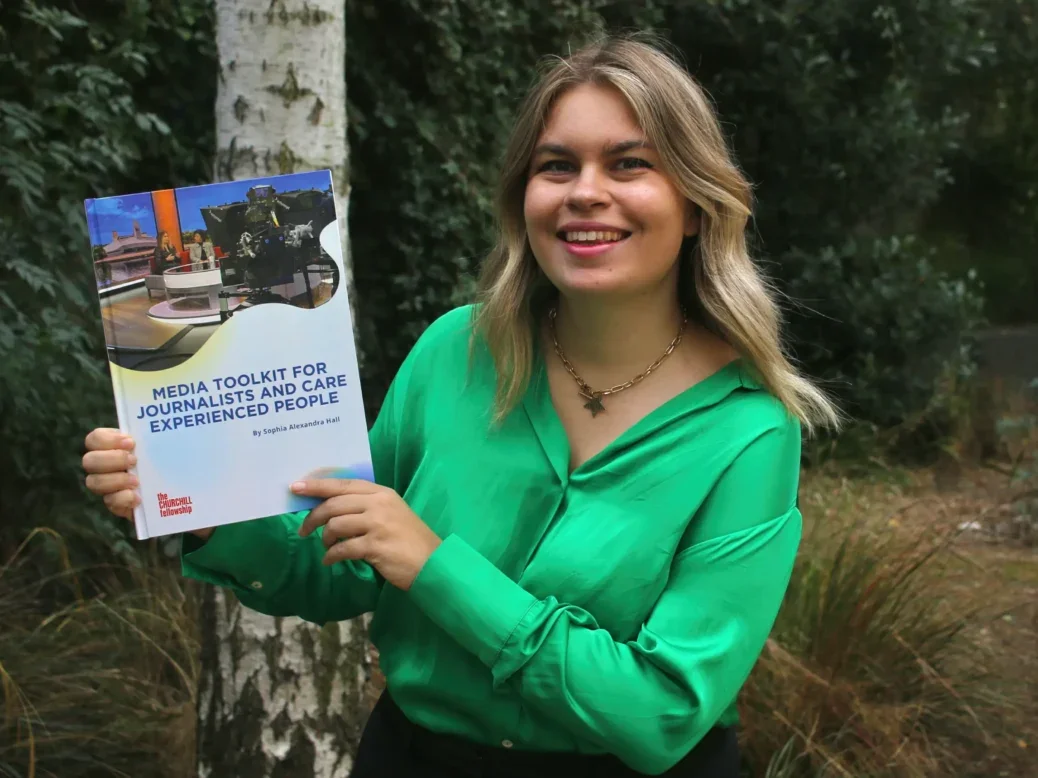
As both a journalist (deputy digital editor at the Big Issue) and a publicly former foster child, I have had numerous members of the care-experienced community reach out to me with stories of media interviews gone wrong. While I did my best to support them over social media messages and texts, I wanted to produce something concrete so that interviewees didn’t have to rely on me or another third party to help them.
I am proud to announce that after three years of research, travel and writing, my Media Toolkit for Journalists and Care Experienced People has now been published and is available for download.
The research was funded by the Churchill Fellowship in partnership with Coram which allowed me to travel to America where I visited local newsrooms and academic institutions including the Dart Center for Journalism and Trauma at Columbia University.
My toolkit covers both practical advice for journalists as well as offering guidance for care experienced people on how to safely work with the media. The catalyst for this project started when I qualified as a journalist (News Associates – funded by the NCTJ’s Journalism Diversity Fund) in 2020.
Members of the care-experienced community began reaching out to me for advice, as all too many of them had had negative experiences when working with the media. Whether a journalist had dug too deep into their trauma, or lent on stereotypes too heavily in the copy, a number of my friends had grown not to trust the profession.
The care experience community is a multi-faceted one. While some within the community may have had a relatively stable upbringing, others may have been exposed to abuse, assault, violence, poverty, human trafficking, incarceration, mental health issues, homelessness, racism, or other life-altering experiences.
One of the topics focused on by the 2022 independent review of children’s social care was the stigma that care-experienced people feel they face. When telling a care experienced person’s story, the media has a chance to combat this stigma and rectify stereotypes. Or it has an opportunity to reinforce them.
In America, while researching my toolkit, I spoke to over 50 people; mostly journalists and care experienced people. I was blown away to find out that almost none of the media professionals I had spoken to had received any kind of trauma-informed training while in journalism school.
Due to the subject of my toolkit, I subsequently connected with child and adolescent psychiatrists, social workers, and other mental health professionals, to learn more about how childhood trauma can impact an interview.
While most journalists are not mental health professionals and shouldn’t need to be, we can employ the same techniques as they do. One such technique I learned for the toolkit was working in ‘thirds’ during an interview.
The first third is a warmup; getting to know the person. Then the middle is the meat of the interview; getting to the hard conversations to find out the information relevant to the story. Finally, leaving that last third for a cool-down means you have time for the person to regulate themselves before ending the interview. This can be a particularly useful technique when working with ‘disempowered’ interviewees.
A disempowered person may have experienced a traumatic event where their choice was taken away. This could be due to non-consensual acts, such as sexual assault, or being a child in the foster care system, where they had no say in where they were being sent to live next.
There’s an unspoken power dynamic in interviews. You as a journalist are the question master – you have all the control. This can be great in interviews with loud-mouthed politicians or sharp-talking CEOs, but it can put more vulnerable interviewees at a disadvantage.
In my toolkit I talk about the act of giving back control to the interviewee. While our respective editorial policies keep us from handing over whole articles to our source, there are small ways you can redistribute power in the room.
If it’s a sensitive topic this could mean sharing quotes with the interviewee prior to sending the final draft to your editor or asking them for suggestions on what stock photos to use to illustrate the piece, if you don’t have permission to use their photo. It could even be as simple as asking them, when they meet you for the interview, where they’d like to sit in the room.
As a journalist, I know how time-constricting deadlines can be and sometimes an interviewee’s wellbeing – despite the best intentions – can fall by the wayside. But as someone who was an interviewee long before they were a journalist, I know just how important it is to do everything we can not to let that happen.
The advice given in the toolkit isn’t just relevant to care experienced interviewees; it could also be applied to anyone with lived experience of trauma. I hope you find this publication interesting, informative and insightful, and I hope it helps you tell care experienced stories in a way that’s both respectful and empowering to those who trust you with their experiences.
Email pged@pressgazette.co.uk to point out mistakes, provide story tips or send in a letter for publication on our "Letters Page" blog
